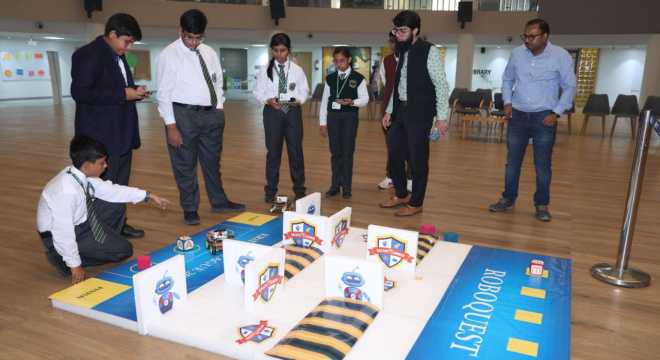

T:+91 7669-933-404
Email: [email protected]
Plot 3A, Sector Omega 1, Near Pari Chowk, Greater Noida, GB Nagar, Pin Code 201308


T:+91 7669-933-404
Email: [email protected]
Plot 3A, Sector Omega 1, Near Pari Chowk, Greater Noida, GB Nagar, Pin Code 201308

Children with strong-mindedness can easily cope with the adversities of the world. Approaches to teaching mental strength include searching for possibilities to instill problem-solving skills, reinforcing positive thinking, raising awareness about feelings, exemplifying courage and self-sufficiency. The best practice is sometimes known as the gradual accumulation strategy, where one starts with little capital and gradually increases one’s levels. Some elements include committment and consistency, staying connected, teaching the right ways of handling stress and assisting children in changing their perspective regarding difficult circumstances. With the two aspects of confidence and self-esteem addressed, patience and emotional well-being are set on very strong foundations.

Patience is much more than the ability to wait; it embodies self-regulation, perseverance and tolerance. A patient child is better equipped to handle frustration and setbacks with composure, develop stronger problem-solving skills, and build empathetic relationships. Teaching patience is a long-term investment in a child’s emotional well-being, academic success and interpersonal growth. It allows them to navigate stressful situations calmly and fosters a positive mindset even in adversity.
Patience enables children to control their emotions and make good decisions while facing challenges. This emotional strength not only aids them in their academic endeavors, but also when in interpersonal relationships throughout their lives.
Children need imagination, sensitivity, and practice to develop patience. Baking, gardening and art teach children that good results take time. These activities also provide them a sense of success, encouraging patience and delayed gratification.
Children learn from adults too. Being patient in traffic, calmly addressing a tough circumstance or displaying understanding during arguments is a strong lesson. Parents and educators inspire children to be patient.
Deep breathing, guided meditation and simple yoga can help children focus and stay calm. These methods help children relax, think and control their emotions. Storytelling, role-playing and turn-based games also teach patience. These strategies make learning fun and relatable for children.
Positive reinforcement boosts positive behavior. Praise for waiting their turn, remaining calm or persevering instil confidence in children. It inspires individuals to stay patient in diverse situations.
By avoiding constant wants and gratification like watching TV or buying toys online, children learn principles surrounding perseverance. It is thus easy for parents to find natural breaks in the day for children to learn patience such as waiting when meals are being prepared or queuing for an activity. These are moments that are instrumental in building a child’s emotional coping skills.
Teaching children to set goals and or create targets and cautiously pursue them is also another way of teaching patience. Whether it is the assembling of a puzzle, learning a new skill or by saving money for a toy they want, children learn the importance of the efforts that they put in to get something. By figuring this out gradually, they get to appreciate the efforts and dedication that fetch results in the long run.
School environment plays a significant role in the promotion of resilience and self-control. Group projects, school routines and controlled play, assist students in the development of patience. These activities involve children being forced to wait for their turn, listen to instructions as well as to cooperate.
Teachers can foster problem solving approaches and teamwork among students. They can assist them to deal with group issues for illustration purposes, particularly in cultivating patience as well as team work. Mindfulness and social-emotional learning programmes will also assist students to be more emotionally strong and patient.
Extracurricular activities like athletics, music and drama help children develop patience. These pursuits frequently call for regular practice, collaboration and the capacity to gracefully deal with failure. These experiences teach children to control their emotions, focus and persevere.
Patience helps one grow to be more emotionally stable in the process of achieving lifetime goals and dreams. Developing this trait enables students to become compassionate people who can overcome adversities in life. Developing patience is not an easy task and can be compared to learning, as it has to be exercised on a daily basis with the use of children’s imagination and in a favourable environment.
It is with pride that JP International School claims a combination of creative ideas and the right setting, which enables the school to mould compassionate, patient and emotionally stable students. JP International School continues to focus on the challenge to prepare future leaders with the courage that is needed in this rapidly changing world.
Patience helps children manage emotions, build resilience and handle setbacks calmly, fostering success in academics and relationships.
- JP International School19 April 2025
Whether through co-curricular activities, international exposure, or digital learning platforms, ...
12 April 2025
JP International School makes students future-ready by imparting 21st century skills through the ...
5 April 2025
A solid education from school creates opportunities for students to grow into confident, responsi...
29 March 2025
Technology allows students' everyday journey, be it in academics or outside of academics, to be t...
22 March 2025
STEM education prepares students for healthcare careers by combining biology, chemistry and physi...
 28 November 2024
28 November 2024
.jpg) 27 November 2024
27 November 2024
 8 December 2022
8 December 2022
